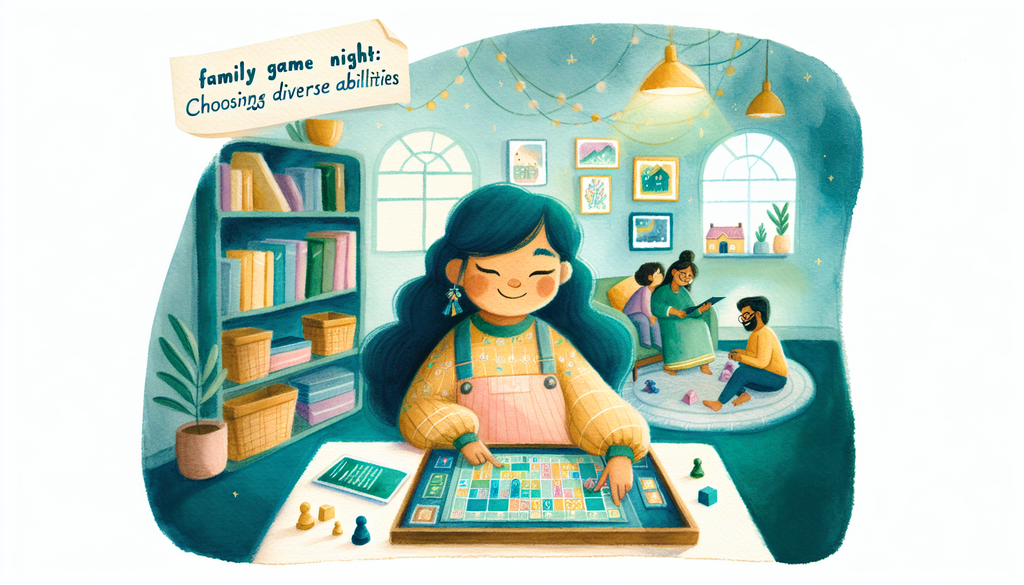Family Game Night: Choosing Games for Diverse Abilities

Family game night can be a fun and beneficial way to spend quality time together. However, when you have children with diverse abilities, selecting the right games can be challenging. Here’s how you can ensure that everyone, including kids with special needs or exceptionalities, can participate and enjoy.
Why is Family Game Night Important?
Family game nights are not just about fun. They provide multiple opportunities for learning, enhancing social skills, and emotional development. For children with special needs and gifted children, these benefits are particularly crucial. Inclusive family game nights can help them practice communication skills, foster patience, encourage teamwork, and nurture a sense of belonging and accomplishment.
Choosing Inclusive Games
Your choice of games should depend on your children’s abilities rather than their ages. Look for games that are flexible and can be adapted to match your child’s skill level or learning style.
Board and Card Games
Board and card games often offer excellent opportunities to adapt rules and tailor gameplay fittingly. Some excellent options include [Uno], [Spot It!], and building games like [Jenga] or [Blokus] that enhance fine motor skills.
Interactive Video Games
Video games aren’t all bad. Some, like [Mario Kart] or [Kinect Sports], offer cooperative play options and can be adapted to different skill levels. These can be great for kids with various abilities as they tend to be visually engaging and enhance hand-eye coordination.
Adapting Games for Diverse Abilities
Adapting games for your family is all about creativity and being open to bend or change the rules.
-
Simplify Instructions: Keep instructions straightforward and clear for children with cognitive or learning challenges. Breaking down tasks into manageable steps can also be helpful, as discussed in our post on Occupational Therapy at Home: Simple Activities to Support Your Child.
-
Add Visual Aids: Some players might benefit from visual prompts. Use pictures or colors to help remember rules or indicate turns. If you’re interested in learning more about how visual aids can play a role in learning, check out The World of Augmentative and Alternative Communication.
-
Consider Sensory Needs: If your child is sensitive to touch or has fine motor skill challenges, consider the game pieces’ size and shape. For instance, larger, more substantial pieces might be easier to manoeuver. If bright lights or loud sounds are problematic, look for games with adjustable settings or those that don’t rely heavily on these features.
-
Adjust the Pace: If you have a child who needs more time to process information or perform a task, consider slowing down the gameplay to suit their pace. This idea echoes our post on Understanding Sensory Processing Disorder in the Classroom, where we emphasize the importance of patience and pace.
Promoting Cooperation and Fairness
Cooperative games, where players work towards a common goal, promote teamwork and limit competition that may be stressful for some kids. Games like [Pandemic], [Forbidden Island], or [Hoot Owl Hoot!] can be great options.
It’s also essential to ensure the selected games offer equal chances for everyone to win. Games primarily based on luck rather than skill can make this possible. Alternatively, adopting handicap systems or providing assistance to those who need it during the game can balance things out.
Consider the advice from our post Promoting Positive Behavior: Reinforcement Strategies that Work about celebrating effort over victory. Make sure to acknowledge and celebrate each child’s participation, effort put forth, and any personal victories along the way.
Finally, while the aim should be inclusivity and fun, it’s also crucial to teach children the invaluable lessons of handling disappointment and losing gracefully.
In conclusion, every child has the right to enjoy recreational and social activities like a family game night. It may take a while to find a handful of games that your entire family enjoys. But with patience, creativity, and a spirit of adaptability, family game nights could soon become a much-anticipated and cherished tradition in your household.